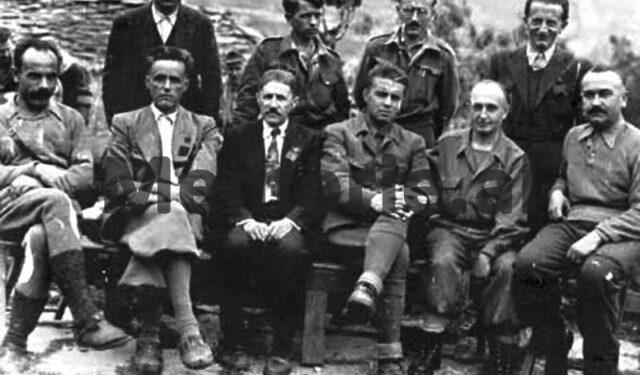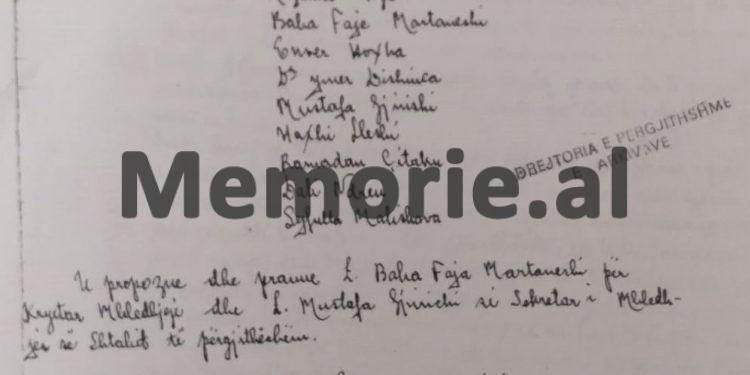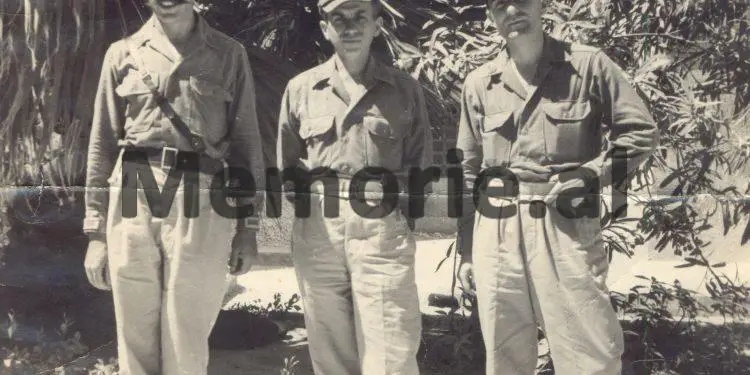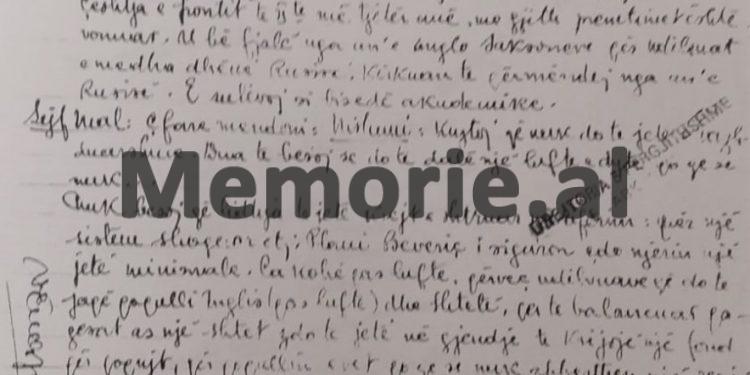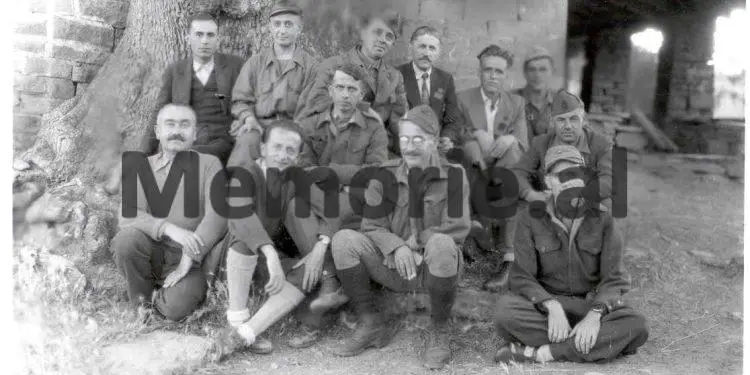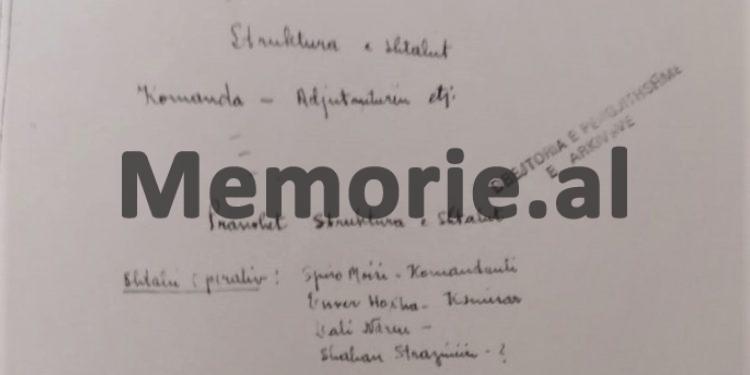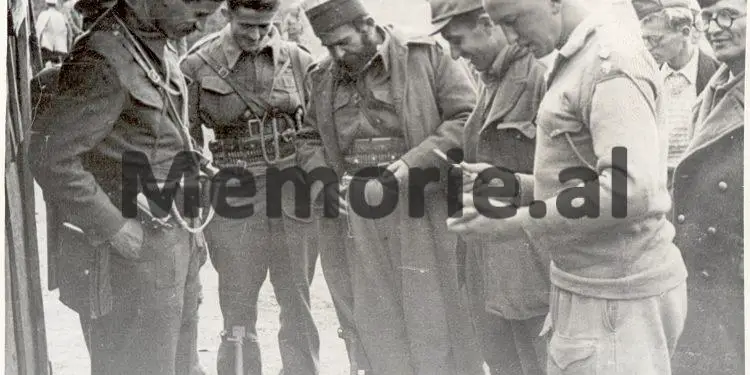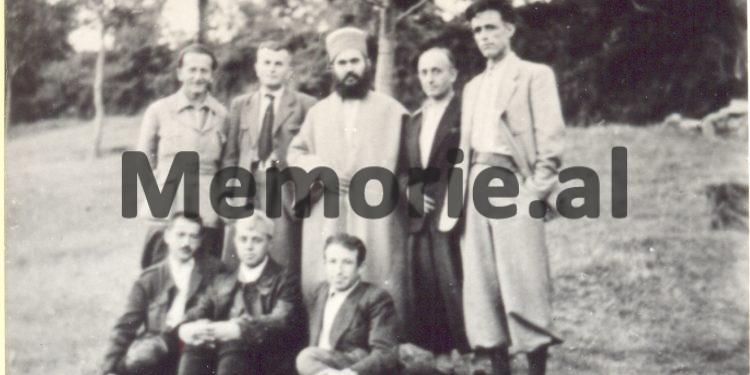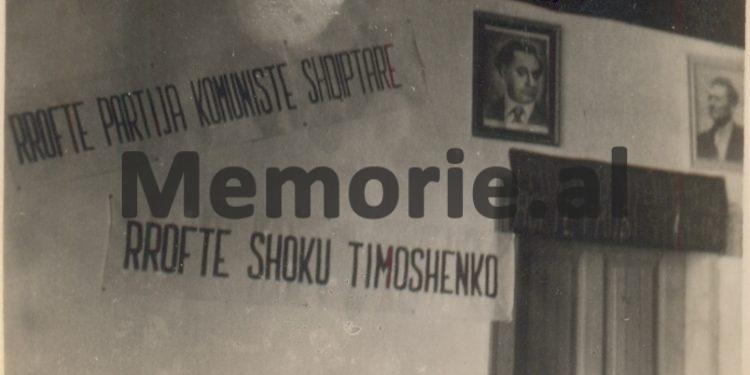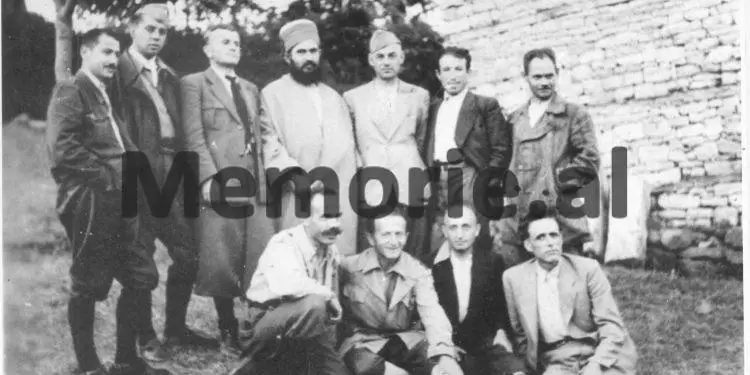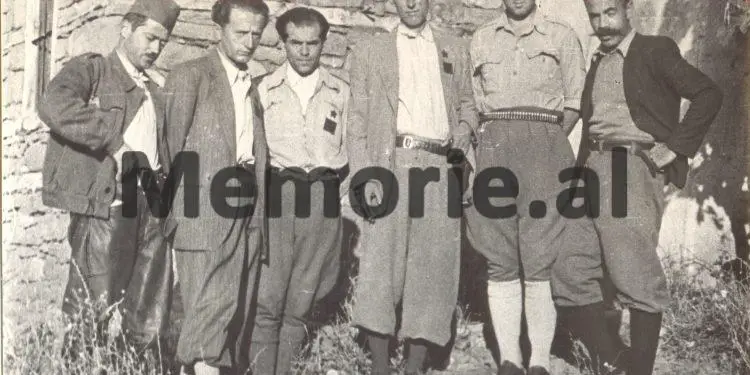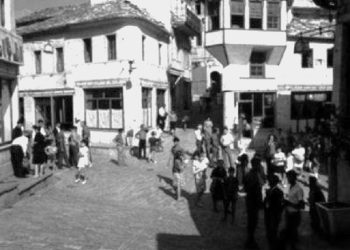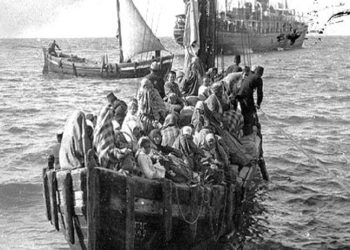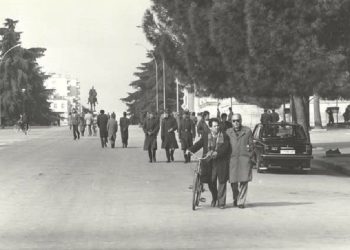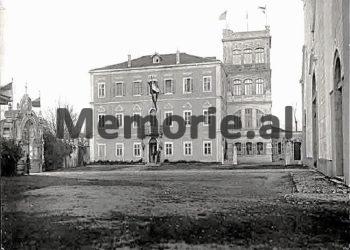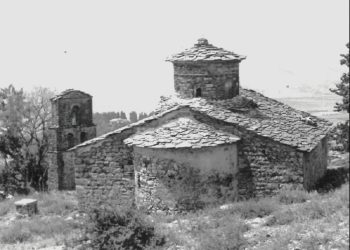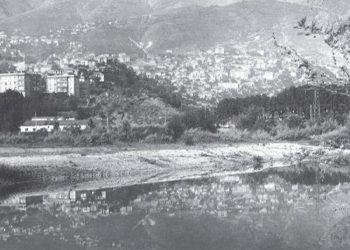Dashnor Kaloçi
Memorie.al publishes the unknown story of the elimination of Enver Hoxha to most members of the General Staff of the National Liberation Army that was formed on July 10, 1943 in the village of Labinot in Elbasan, where his commander was elected Major Spiro Moisiu, and political commissar, Enver Hoxha. The tragic fate of the members of the General Staff, where out of 13 of them, only Myslym Peza and Haxhi Lleshi escaped the iron hand of Hoxha, after Mustafa Gjinishi, Koci Xoxe, Dali Ndreu, Liri Gega, Nako Spiro and Baba Faja were executed, Abaz Kupi escaped, Bedri Spahiu was interned and imprisoned, Sejfulla Malëshova was interned and died in exile, while Spiro Moisiu and Ramadan Çitaku were demoted and removed from their positions, leaving them in honorary positions. In addition to members of the General Staff, Enver Hoxha struck and eliminated most of the commanders and commissars of brigades, divisions, corps and other units of the National Liberation Army, who had led the Anti-Fascist War, where most of them were shot. , were imprisoned, or interned until the fall of the communist regime in 1991!
According to a decision of the Central Committee of the Albanian Communist Party, on July 4, 1943 in the village of Labinot in Elbasan, the General Council of the National Liberation convened, which decided to establish the General Staff of the National Liberation Army, which would consist of 13 people. . According to this decision, on July 5, the first meeting of the General Staff took place, where Major Spiro Moisiu and political commissar Enver Hoxha were elected its commander. On July 11, the General National Liberation Council issued a proclamation publicly announcing through the tracts that: The General Staff of the partisan Army had been established.
But who were the members of this Staff and what was their subsequent fate. After Major Spiro Moisiu who had been a military career since the time of the Zog Monarchy and who was elected commander of this Staff, as well as Enver Hoxha who was elected to the post of political commissar, the other members were: Abaz Kupi, Dali Ndreu, Myslym Peza, Liri Gega, Mustafa Gjinishi, Koci Xoxe, Haxhi Lleshi, Baba Faja Martaneshi, Bedri Spahiu, Ramadan Çitaku and Nako Spiro. Of the 13 members of the General Staff, apart from the commander, Major Spiro Moisiu, only Bedri Spahiu had been a career soldier in the years of the Zog Monarchy and Dali Ndreu, who had studied at a military school in Italy. Likewise, Abaz Kupi had served in the Gendarmerie during the time of Zog with the rank of major, while all other members of the Staff had no connection with the military.
Hitting members of the Army General Staff
From the members of the General Staff of the National Liberation Army, except Myslym Peza and Haxhi Lleshi who escaped the iron hand of Enver Hoxha (who after the Congress of Përmet was proclaimed Commander-in-Chief of the National Liberation Army with the rank of almost colonel-general) all others were eliminated or executed on his direct orders during and after the War. In addition to members of the Staff from the time of the War onwards, Enver physically attacked and eliminated most of the commanders and commissars of the partisan detachments, battalions, divisions and brigades that led the partisan war.
The first member of the General Staff to be ousted by Enver Hoxha was Major Abaz Kupi, who left the General Staff and the Democratic Front himself in 1943, after numerous disagreements with Enver. After leaving the Front, Kupi formed the Legality Movement in the autumn of that year in the village of Zall-Herr in Tirana, (where the first Congress of the Legality Movement was held), thus declaring himself a sworn enemy of Enver Hoxha. After Abaz Kupi, it was Mustafa Gjinishi who was hit by Enver Hoxha, but even though Gjinishi was part of the General Staff, he had a nationalist conviction and as such, that at the Peza Conference he was assigned to work with nationalist elements, for their approach to the ranks of the Democratic Front led by the Communist Party, as he had links with most of the Albanian nationalists where some of them led the anti-fascist factions.
According to Enver Hoxha’s own memoirs, he suspected Gjinishi that he was an agent of the British and for this reason (Enver) ordered his elimination, which was carried out by Liri Gega. Regarding the execution of Gjinish, Shyqëri Këllezi, former personal guard of Enver Hoxha during the War and later a member of K.Q., testified publicly in the press of the ALP. Këllezi, who since the establishment of the General Staff has also had the duty of commander of the guards of this headquarters, has stated: “I was near the General Staff in the area of Korça. Enver and Miladin were sitting next to the radio operator who was giving and receiving radio. After a while they both got to their feet and embracing each other began to lift each other to their side. Then they ordered all the Staff and its guards to line up in front of the tent. There, Enver announced that: during an action in the villages of Peshkopi, the member of the Staff, comrade Mustafa Gjinishi, was killed and in his honor we held a black minute “.
After the assassination of Gjinish, Enver Hoxha started attacking some commanders and commissars of nationalist and partisan factions, but as we mentioned a little above, the first rift between Enver Hoxha and members of the Staff, had started with the departure of Major Abaz Kupi, who did not agree with the policy that Enver was pursuing. In this context, the first to be executed by direct order of Enver Hoxha, were: the commander and commissioner of the “old platoon” of Vlora, Neki Ymeri with the nickname “Vangjo” and Xhemil Çakërri “Milo”. Their execution came because they had not carried out Enver Hoxha’s order to execute Sadik Premta, one of the founders of the SNP, who had been assigned to the Vlora gang, which Enver described as a franchisor along with Anasatas Lula.
Anastasi, after Enver’s order, was executed by a group of partisans from Berat (led by Orhan Frashëri), while Sadik Premtja managed to escape the ambushes that were set up several times. Neki Ymeri and Xhemil Çakërri, not only did not carry out the order for the execution of Sadik Premte, but they were also his main supporters. This was the reason why Enver ordered their execution, which was entrusted to Liri Gega, who carried it out through some partisans of Mehmet Shehu’s 1st Brigade. This happened after Dushan Mugosha and Liri Gega called them for talks in a village of Mallakastra.
Elimination of Staff members in the years 1944-1949
The elimination of the members of the Staff, which started with Mustafa Gjinishi during the War, continued after the War. Thus after the elections of December 2, 1945, Enver designed to eliminate some military who did not agree with the political line he was following at the head of the CPA. After Enver “finished work” with the senior military who had led the Albanian National Army during the Monarchy, shooting generals Gustav Mirdash, Aqif Përmeti (and some of their followers, former colonels, majors, captains, etc.), he addressed the major military men of his army. In 1946, Enver Hoxha dismissed Major General Spiro Mojsiu from the post of Chief of Staff, retiring him at the age of 47. This came after Mojsiu opposed the arrival of Yugoslav military specialists in the Albanian Army, who, according to him, had nothing to teach the Albanian military! “We are thugs, they are thugs.”What will we learn from them”, said Mojsiu during a conversation with Enver Hoxha.
After that, Tito’s emissaries, who controlled everything in all the ministries through their advisers, suggested to Enver that: he could not lead the Albanian Army, a soldier of the Zog Monarchy. Mojsiu was then appointed Commander of the Tirana Garrison and in other duties with the Volunteer Forces, leaving him in honorary duties and he was invited only in cases of official ceremonies, mainly like the one on July 10, which commemorated the establishment of the General Staff. After Mojsiu, in 1947 Enver started the attack on Sejfulla Malëshova who dismissed him from the position of Minister of Culture and all other state and party functions he held and then interned him in the district of Fier where he also died in 1971, (in still unexplained circumstances) after working as a tobacco storekeeper.
After Malëshova, on charges of being “agents of the Anglo-Americans and traitors of the Front”, Enver Hoxha ordered the arrest of Colonel Mestan Ujanik, (Commander of the first partisan platoon in Albania and deputy of the Berat Region), Colonel Islam Radovicka (Commander of the First Operational Zone Vlora-Gjirokastra), Colonel Zenel Shehu, the commander of the Tepelena partisans, who had financed the war in that province, and Colonel Rexho Plaku, one of the legendary leaders of the partisan detachments in the Chameria area. The first three were shot, while Rexho Plaku and some of their successors, such as Nexhmi Ballka, etc., were subjected to long prison terms.
At that time, Colonel Kadri Hoxha, former Commander of the District of Elbasan and representative of Albania at the Headquarters of the Allied Forces in Italy, was also arrested and imprisoned. Kadri Hoxha suffered long prison terms until 1990. One of the victims of Enver Hoxha was Colonel Baba Faja Martaneshi, a nationalist who on March 19, 1947, by order of Enver, together with Baba Fejzon went to the World Headquarters of the Bektashis, to ask her Grandfather (Njiazi Dede Baba Abazit) making the statute of that Headquarters, according to the order and suggestions of the government. Bektashi’s grandfather, Baba Abazi, did not accept that and killed Baba Faja, Baba Fejzon and himself inside the Grand’s. One of the other members of the Staff who was eliminated as a result of Enver’s direct pressure was Nako Spiro. According to the official version, Nako allegedly killed himself in his office after Enver accused him of being sold to the Yugoslavs.
After Nako Spiro, from the former members of the General Staff, Ramadan Çitaku was eliminated, who was known differently by the nickname “Baca”. After returning to Albania from the post of ambassador to Belgrade, “Baca” was assigned to secondary duties (at the State Bank), and he isolated himself by not leaving the house at all, until he passed away in 1989. (At that time, few knew that Çitaku was alive and had lived in Tirana). After the elimination of Nako Spiro, Major General Tahir Kadare (former commander of the VI Partisan Brigade and Commissar of the First Division and Nexhip Vinçani, Deputy Chief of General Staff were eliminated by the army and interned in that period. Enver Hoxha started it on the eve of the 1st Congress of the SNP, and then in 1949, Enver Hoxha hit his closest collaborator, Lieutenant General Koci Xoxen.
Anti-Fascist War Commanders and Commissars who were shot, imprisoned and interned from 1944 to 1991
1st Brigade
Commander Commissar
- Mehmet Shehu (suicide) 1. Tuk Jakova (died in prison)
- Muhamet Prodani (prisoner) 2. Arif Hasko (prisoner)
2nd Brigade
Commander Commissar
- Beqir Balluku (shot) 1. Vasil Konomi
3rd Brigade
Commander Commissar
- Hulusi Spahiu (prisoner) 1. Shahin Ruka
- Saliko Sulo 2. Osman Sinani (convicted)
- Muzafer Spaho (convicted)
IV Brigade
Commander Commissar
- Nexhip Vinçani (persecuted) 1. Pëllumb Dishnica (prisoner)
- Zija Kambo
5th Brigade
Commander Commissar
- Abaz Shehu 1. Hysni Kapo
- Shefqet Peçi 2. Hito Çako (shot)
- Bendo Asllani
VI Brigade
Commander Commissar
- Tahir Kadare (convicted) 1. Mustafa Matohiti
- Jaho Gjoliku 2. Haki Toska
- Sotir Filto 3. Xhule Çiraku
VII Brigade
Commander Commissar
- Gjin Marku (died in prison), 1. Kadri Hoxha (imprisoned)
- Musa Daci (convicted), 2. Qazim Kapisyzi
VIII Brigade
Commander Commissar
- Hasaf Dragoti 1. Qazim Kondi
- Feti Smokthina 2. Minella Bulku
- Rasim Bazo
IX Brigade
Commander Commissar
- Irakli Bozo 1. Mihallaq Ziçishti (prisoner)
X Brigade
Commander Commissar
- Njazi Çepani 1. Kahreman Ylli
XI Brigade
Commander Commissar
- Mevlan Dervishi 1. Halil Pulaj
- XIIth Brigade
Commander Commissar
- Refat Bajrami 1. Qemal Klosi
- Rahman Parllaku (prisoner)
XIV Brigade
Commander Commissar
- Gjon Banushi 1. Gafur Çuçi
XV Brigade
Commander Commissar
- Teki Kolaneci 1. Shahin Ruka
XVI Brigade
Commander Commissar
- Spiro Bakalli, 1. Avdyl Këllezi (shot)
- Rrahman Uruçi (prisoner), 2. Tajar Grepcka
- Nikollaq Sallabanda (convicted)
XVIIth Brigade
Commander Commissar
- Gjeli Argjiri (suicide), 1. Qamil Guranjaku
XVIII Brigade
Commander Commissar
- Esat Ndreu (prisoner), 1. Miço Kallamata
- Petrit Dume (shot)
XIXth Brigade
Commander Commissar
- Thoma Xhixha, 1. Vango Mitrojorgji (convicted)
XXth Brigade
Commander Commissar
- Riza Kodheli, 1. Misto Treska
XXII Brigade
Commander Commissar
- Sali Verdha, 1. Tonin Jakova
- Rexhep Zyma, 2. Nimet Ymeri
- Neshat Hysi
XXIII Brigade
Commander Commissar
- Hamit Keçi (prisoner), 1. Xhavit Qesja (prisoner)
- Haxhi Seseri (convicted), 2. Mërkur Çela (convicted)
XXIV Brigade
Commander Commissar
- Ndreko Rino 1. Abedin Shehu (prisoner)
XXV Brigade
Commander Commissar
- Veli Niman Doçi (executed), 1. Nuri Arapi
XXVII Brigade
Commander Commissar
- Sadik Bekteshi (prisoner) 1. Tajar Grepcka
(Note: Brigades 13, 21 and 26 did not exist). Memorie.al
Continues in the next issue




